
When faced with challenging or unforeseen circumstances, the air component staff at U.S. Air Forces Europe – Air Forces Africa has long had a proven provider of solutions it can turn to.
The men and women of the Michigan Air National Guard’s 217th Air Operations Group, part of the 110th Wing stationed at Battle Creek Air National Guard Base, have been aligned for more than a decade with the Major Command (MAJCOM) headquarters — located at Ramstein Air Base — to provide essential augmentation, personnel, and experience when called upon.
Recently, this mission alignment was tested like never before as communications experts from the 217th AOG, 110th Communications Flight, and the 110th Operations Group stepped up to assist USAFE-AFAFRICA’s MAJCOM Communications Coordination Center (MCCC) when called upon. As the coronavirus pandemic forced active duty staff members to adjust crew schedules to implement social distancing and other risk-mitigating factors, the Michiganders took responsibility for the MCCC’s night shift operations in March 2020. Their role as MCCC event controllers lasted a full year, making them the focal point for all Air Force communications units in the USAFE-AFAFRICA area of operations, with responsibility to receive, monitor, coordinate, facilitate, and lead cross-organizational troubleshooting and repair actions – among other duties.
“The [Battle Creek] team was of absolute paramount importance in carrying the torch through the night and helped pass information from our swing shift to our day shift,” said U.S. Air Force Col. Andrew D’Ippolito, communications director and chief information officer for USAFE-AFAFRICA. “I am thankful for the team’s awesome support to the USAFE-AFAFRICA mission.”
Uniquely, this crucial support for one of the Air Force’s busiest MCCCs — the only one operated 24/7, 365 days a year, with oversight of communications networks for 88 geographically separated units across the 104-nation USAFE-AFAFRICA area of responsibility — was performed 100% remotely from the ANG facility in Southwest Michigan.
U.S. Air Force Master Sgt. Brian Leonard, superintendent of communications for the 217th Air Component Operations Squadron, was responsible for overseeing the staff in Michigan, ensuring they had the equipment to perform their duties and that orders, pay, and individual needs were met, especially as the mission’s completion date was extended multiple times.
“The mission was originally scheduled to end in April of 2020, but we were asked to extend several times until March of 2021,” Leonard said. “The transition was surprisingly easy because we have built the capability and preparedness over the years through training and exercises [with our counterparts from USAFE-AFAFRICA].”
This ability to seamlessly integrate and flex under dynamic circumstances was most clear in late 2020 when the entire MCCC staff at Ramstein was quarantined due to COVID-19 exposure. The Michigan team took point as the main source of continuity for 10 days.
“We had to essentially surge operations to cover that period until we could return to a normal operations tempo,” said U.S. Air Force Lt. Col. Daniel Fawcett, chief of communications theater operations and plans for the 217th ACOS. “This was the first time we had to branch out from our internal [217th AOG] manpower to cover mission requirements, but we were able to leverage other existing on-base expertise from the 110th CF and the 110th OG.”
A total of seven Airmen made Battle Creek’s groundbreaking support for the USAFE-AFAFRICA MCCC possible, with two of them — Tech. Sgt. Lewis Banks, Staff Sgt. Jennifer Rumsey (both from the 217th ACOS) — supporting for the entire one-year mission. They were joined for periods ranging from two to six months by Tech. Sgt. Justin Oosterbaan, Tech. Sgt. Robert Zellers, and Staff Sgt. Robert Rainone of the 217th ACOS, Staff Sgt. Ryan Swartzendruber from the 110th OG, and Senior Airman Donovan Wentworth from the 110th CF.
Collectively, their efforts have been credited with guaranteeing that the senior leaders of U.S. European Command, African Command, Central Command, Defense Information Systems Agency, Air Forces Cyber, and USAFE-AFAFRICA maintain access to information systems and networks. These networks provide near real-time data to decision-makers, help project warfighting capability, and secure national security objectives.
According to D’Ippolito, they additionally contributed to the MCCC winning high-level team awards, maintaining 99% network uptime rates, and assisting with a tenfold increase in Ramstein, AB network capacity.
The success of a Total Force initiative like this demonstrates the mission-critical nature of the relationship between active duty components and their aligned ANG units.
“The willingness to learn the job and support the mission that these men and women showed was second to none,” said D’Ippolito. “We absolutely could not have accomplished USAFE-AFAFRICA efforts and missions without them.”


